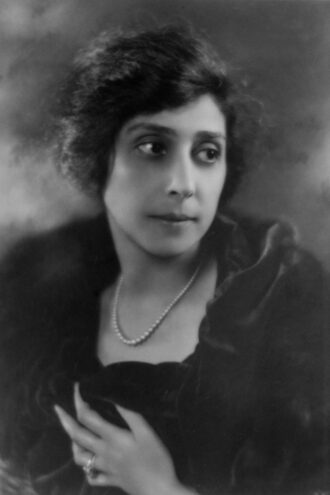Throughout the first half of the 20th century, the oil-rich elite of a rapidly growing Dallas whispered their secrets to a dark-haired woman in the dressing rooms of Neiman Marcus. Elegantly dressed in all black, with a simple double strand of pearls and chunky French gold link bracelets, Carrie Marcus Neiman was quiet and reserved, but wealthy women from far and wide would come to shop the styles chosen by the city’s most influential fashion pioneer.
The daughter of Jewish German immigrants, Carrie, along with her brother Herbert Marcus and her husband, Al Neiman, founded Neiman Marcus, the high-end department store that revolutionized the ready-to-wear fashion industry, in 1907. The men handled the finances, and Carrie chose the merchandise, traveling to New York and Europe to find the fabrics and styles that put Dallas fashion on the map.
Although Carrie’s story has long been forgotten, “she was the real creative force behind the birth of high-end retail,” her great-great niece Allison Smith says.
Carrie’s story is finally being told in a new exhibit at Southern Methodist University. “An Eye for Elegance: Carrie Marcus Neiman and the Women Who Shaped Neiman Marcus” will be on display through January 28, 2022, in Fondren Library’s Hillcrest Exhibit Hall.
The exhibition itself is quiet and understated, just like Carrie, but it peels back the layers of a woman whose legacy was often drowned out by the egos and drama of the men in her life.
Displays include some of Carrie’s old clothes, a wedding dress she designed, and her iconic gold bracelet and pearl necklace, as well as photographs, postcards, and other ephemera, including letters from her contemporaries, magazine articles, and videos of Carrie herself.
The exhibit also highlights other women who were essential to the store’s history, such as buyer Moira Cullen, food director Helen Corbitt, and the first fashion promotions director, Kay Kerr. These women, along with Carrie, says Allison, made Neiman Marcus what it is today: “a relevant topic 114 years later.”
“There is a lot to digest in this exhibit,” says Michael Thomas, who helped put it all together. “There is so much more to this person.”

The exhibit itself was inspired by a new book, A Girl Named Carrie, written by her great-niece Jerrie Marcus Smith, Allison’s mother. On sale December 15 (you can read an excerpt in the latest issue of D Magazine) the book details Carrie’s extraordinary work ethic, Pygmalion eye for future fashions, and the personal difficulties she overcame to make Neiman Marcus a fashion juggernaut.
Jerrie says she was fed up people were only talking about Neiman and Marcus, so she decided to write a book about Carrie as her pandemic project.
“I picked her because nobody was talking about her, and it made me mad,” Jerrie says. “Here was this woman who worked just as hard as they did, so let’s talk about her.”
As they looked into Jerrie’s research, and as the book was delayed six weeks due to supply chain issues, Allison and Thomas decided there was so much more to the story to tell.
“Ok, we have all of this time and all of this research going,” Allison says. “What else can we do with it?”
So, she and Thomas approached the DeGolyer Library at Southern Methodist University with the idea for the exhibit. The library had a six-week slot open, “so we took the opportunity and started work that hour,” Allison says.
They worked with the DeGolyer and Eugene McDermott libraries, the Texas Fashion Collection, and members of the family to piece together items for the exhibit on the quiet woman who so often stood away from the spotlight.
“Carrie, I think, was too modest,” Jerrie says. “She was never looking for accolades for things about herself.”
However, Jerrie thinks Carrie would have been pleased to see the exhibit and tribute to her legacy.
“She would be secretly very, very honored.”






